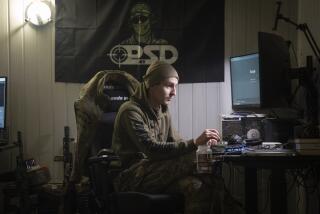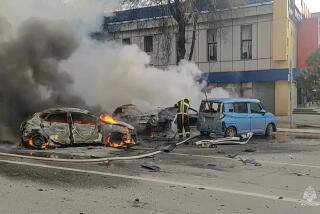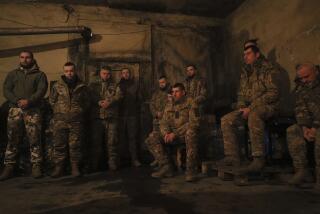Rebel Chechens Ready for New Russian Assault : Caucasus: The renegade republic expects a fight today as deadline to submit to the Kremlin expires. A helicopter from Moscow is shot down as peace talks falter.
GROZNY, Russia — Showing no chink in their defiance, rebel Chechens shot down a Russian helicopter gunship Wednesday and steeled themselves for the bloody storm of their capital that they expect when the deadline to submit to Kremlin rule expires today.
Peace talks, mired in the dispute over whether the mountainous Muslim republic is part of Russia, broke down, and Chechen President Dzhokar M. Dudayev went on television to exhort his citizens to smite the Russian interlopers until they “die of fear and horror.”
Russian tank columns closing in on Grozny from three directions stopped six to 10 miles from the Chechen capital, according to Russian Nationalities Minister Nikolai Yegorov, who is largely handling the crisis for the Kremlin. The troops were ordered to seal off the city early today.
Declaring that the Russian forces moved into Chechnya to “liberate it from the Dudayev regime,” Yegorov said they would not storm Grozny before the deadline but left ominously unclear what would happen next. He said only that Chechens who do not surrender their weapons will be disarmed by force.
“We appeal to the leaders of the unlawful armed formations: Stop trying the long patience of the Federation!” an official Russian government statement said. Meanwhile, fighting broke out sporadically north of Grozny. Chechen sources reported a massed attack of nearly 200 tanks and armored vehicles Wednesday evening on their position 10 miles northwest of the capital.
They said missile and aviation attacks left 24 villagers dead to the capital’s north, but Russian air force officials denied that they had hit any civilian targets.
Casualty counts in the four days of Russian intervention in Chechnya vary, but it appeared that dozens of people have been killed. Russia’s Independent Television also reported that about 100 soldiers have been taken prisoner.
To the southwest of Grozny, Chechen militants shot down a Russian helicopter gunship and, according to Russian counterintelligence chief Sergei V. Stepashin, “literally tortured the crew” to death. Video footage on Russian television showed Chechens kicking the wounded pilot onto a stretcher.
In Moscow, reports on the Chechen offensive dominated the newspapers, many of them full of trepidation.
“War won’t solve a single problem,” read a headline in the respected New Times magazine. “The Afghanistan variation is proposed for solving the Chechen problem.”
A poll by the Russian Mnenie service found that although a majority of Russians thought the Chechnya crisis threatened Russia’s integrity, only 11% favored using force to resolve it.
Russian President Boris N. Yeltsin, who underwent elective surgery on his nose on the eve of the offensive, was expected to return to work in the Kremlin today, a spokesman said.
World response to the Chechnya conflict has been fairly muted. Western countries, including the United States, have said that they see Chechnya as Russia’s internal problem and that it would be in nobody’s interest for Russia to disintegrate.
Foreign Minister Andrei V. Kozyrev let the world know Wednesday that its response should stay that way. “I wouldn’t advise anyone to interfere in Russia’s internal affairs,” he said.
Chechnya, which has fought Russian attempts to incorporate it since the 18th Century, declared its independence in 1991. Moscow tried everything from talks and economic pressure to covert support for Dudayev’s opposition to bring it back into the fold, but nothing worked.
On Sunday, the Kremlin sent in tank columns and thousands of troops backed by planes and helicopters. It said military pressure would help bring results at peace talks. Russian officials said they would not storm Grozny, only encircle it. They also sought to stop the influx of arms and supplies to Chechen rebels.
Bad weather has hindered the operation, as has unexpected resistance from residents in the republics of Ingushetia and Dagestan who blocked the Russian troops as they passed through toward Chechnya.
Yegorov laid out the Kremlin’s long-term plan for the republic of about 1.2 million people. He said he plans to stay in Grozny as the president’s representative and oversee the imposition of the Russian constitution here and elections in 1995.
Dudayev had different plans. He told his citizens that “the soil must burn under the feet” of Russian soldiers, and he told central Ostankino Television that he will never forsake his resistance to Russian rule.
The Russian troops “will be attacked from the rear in the traditional tactic of mountaineers,” he said. “Hit and run, hit and run, until they give up out of fear and terror.”
In Grozny, the streets were largely deserted except for residents lining up for bread.
There appeared to be little hope that negotiations would allow Moscow and Grozny to avoid greater bloodshed. Although the Chechen side said it had left the talks in the neighboring city of Vladikavkaz merely for a “working break,” it also refused to sign a document acknowledging that Chechnya is part of Russia.
“We were put in a position in which we had no choice but to cut off the talks,” Usman Imayev, the chief prosecutor of Chechnya, told Russia’s Itar-Tass news agency.
Yegorov said Chechnya had demanded that it be treated at the talks as an independent state, and “We will never agree to that.”
Boudreaux reported from Grozny and Goldberg from Moscow.
More to Read
Sign up for Essential California
The most important California stories and recommendations in your inbox every morning.
You may occasionally receive promotional content from the Los Angeles Times.










